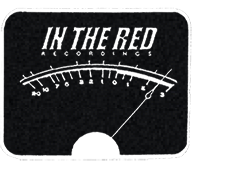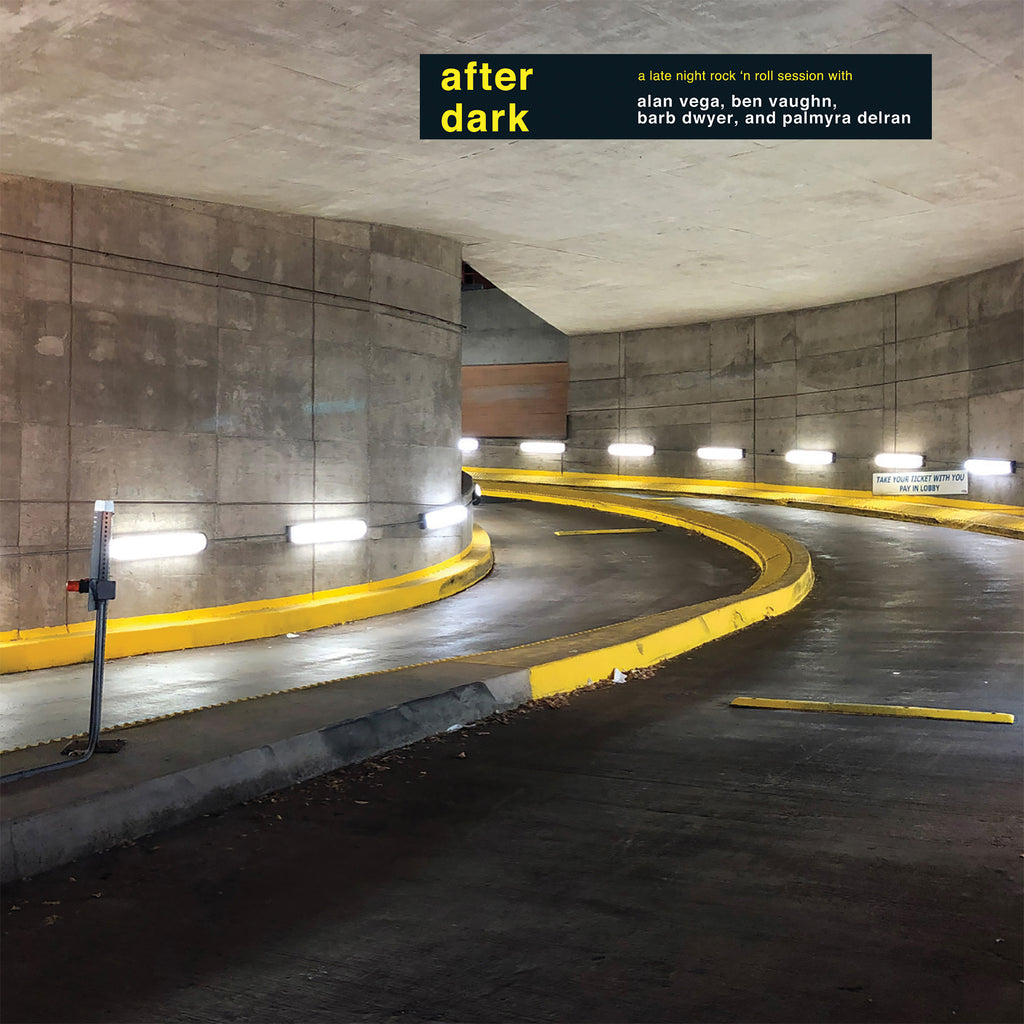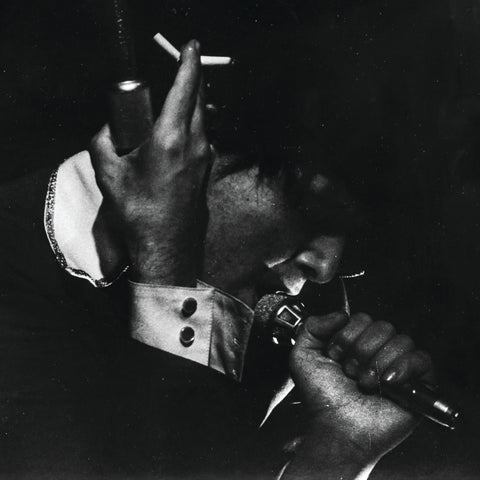Alan Vega, Ben Vaughn, Barb Dwyer & Palmyra Delran - Alan Vega After Dark
Alan Vega, Ben Vaughn, Palmyra Delran & Barb Dwyer
$ 10.00
PLEASE NOTE: LP IS TEMPORARILY OUT OF STOCK AND BEING REPRESSED.
2021 is shaping up to be the year of Alan Vega. Every year should be but, this year is definitely it. The announcement of the opening of the Alan Vega archives which will be unleashing an untold amount of unreleased material dating back to 1971 via Sacred Bones, the release of Mutator (a lost album from the mid 90’s) which has gained rave reviews, a massive feature in the NY Times…Alan has been celebrated everywhere of late. In The Red is over the moon to participate in this celebration with the release of Alan Vega After Dark - an album that captures a late night rock n’ roll session with Alan backed by Ben Vaughn, Barb Dwyer and Palmyra Delran(all members of the incredible Pink Slip Daddy as well as countless other cool projects). This album serves as a reminder that Alan Vega was an incredible rock n’ roll/blues/rockabilly vocalist. He was one of the best.
From the desk of Jason P. Woodbury:
I only spoke with Alan Vega once. It was over the phone and the topic of discussion was the 2015 reissue of Cubist Blues, the phenomenally out there album he’d originally released with collaborators Alex Chilton and Ben Vaughn in 1996. I was in a noisy stadium for reasons that no longer matter at all, on a cell phone, but even with all that extra noise considered, Alan was exceptionally difficult to understand. At first at least. He’d suffered a stroke a few years earlier, in 2012, which still had lingering effects on his speech. But even before that, his heavy East Coast accent had sometimes made him hard to decipher, lending his voice the character of “a cab driver describing fine art,” Vaughn says. If you weren’t from New York—specifically Alan’s New York, an older version of Gotham that may have died with him on July 16th, 2016, when he passed on his sleep—it could be hard to keep up. But after a few minutes, I adjusted to the rhythm. Suddenly, without warning, I found myself able to dance to the peculiar beat of Vega’s jutting back and forth, his Jewish mystic cadence, the kind you hear in gasps and yelps on the transgressively savagely conceptual records he made in the late ‘70s with Martin Rev as Suicide, or the solo records he made starting in the 80s and continuing through to his final studio album "IT" finished in early 2015 and released posthumously in 2017, collages of machoismo-powered rockabilly, space cadet hard rock, renegade cowboy soul, and neon-drenched pop art Americana. You acclimate and then boom: You’re immersed in the “one-man subculture,” to borrow Vaughn’s description, of Alan Vega.
Though his relationship to the mainstream was flirtatious but never a fully committed one, Vega’s sub rosa influence on a disparate but extensive list of punks, new wavers, industrial deconstructionists, garage rockers, and pop stars is clear. His admirers included Ric Ocasek of the Cars, a frequent collaborator, and Bruce Springsteen, whose 1982 album Nebraska, particularly the creeping song “State Trooper,” explored the same haunted backroads Vega sang about. “The bravery and passion he showed throughout his career was deeply influential to me,” Springsteen noted on his Facebook page, memorializing Vega. “There was simply no one else remotely like him.”
No one else like him. That was certainly the case in 2015, when Vega decamped to Renegade Studio in New York City’s West Village with Vaughn on guitar, bassist and keyboardist Barb Dwyer, drummer (and Sirius XM DJ) Palmyra Delran, and engineer Geoff Sanoff. Sporting sunglasses, a knit cap and long rider coat, Vega looked tough as nails in his 78th year, and as always he was dedicated to the moment, to capturing the ghosts for what would prove to be his final live band recording.
Years before, the stroke had slowed Vega down, but he’d recovered and continued making music, often remotely, vocalizing over pre-recorded tracks by electronic musicians. He wanted a different feel for this project, wanted “to feel connected,” Vaughn says, to the musicians in the room, the way it had worked when they made Cubist Blues with Chilton, a music industry rebel in his own right. That record had taken two frenzied, off-the-cuff nights, this album required only one. “We got better at it,” Vaughn says with a chuckle, his velvet voice—the one I’ve so often heard on his essential and always joyous radio program and podcast The Many Moods of Ben Vaughn —underserved by my cellular telephone (once again).
Vega was obsessed with the enormity of any given moment, and to that end, he insisted the band be assembled with absolutely no preparation. They would be responsible for creating, ears tuned to each other and Vega’s incantations, a spontaneous space for his magical recitations. “It’s the only way I’ve ever worked with him,” Vaughn says. “We would start playing, and Alan would wait a little bit,” drawing in a notepad the entire time, working on his “zillions of sketches” — potential self-portraits, though he’d be loathe to indulge you asking if they were — or reading his copy of the New York Post. Eventually he’d rise to the microphone. “Some of the stuff he comes up with, it’s really unbelievable,” Vaughn says, citing the elementally profound lyrics for “River of No Shame,” delivered for the first time as the band churned on. “The animals are hunting, the animals are hunting/Making a break for the river/Making a break for the river/The river of no shame,” Vega riffs, over a motorik groove that’s somehow equal parts Neu! and John Lee Hooker.
Vega didn’t consider the marketplace at all, never considered what would become of his art after he made it, living like the embodiment of what visionary director David Lynch would describe as “the art life.” For Vega creating was the sacred act. Creations? He could take them or leave them. “Liz, Alan’s wife, has told me that when he would finish a painting, he’d immediately paint over the canvas — she’d have to snatch them away from him,” Vaughn says.
Luckily, Vaughn and company have been able to do something like that with Alan Vega After Dark, a set of songs that exist fully in their genesis, realized and recorded one night in New York City. They snatched one away from Alan, so we can pore over it. Listening to it, Vega’s words sometimes slip past me, like they did early in our single phone call. Wait, what was that he just said? It might have been the secret of the world! But I have the luxury of knowing that even as I can return to the LP over and over again, I’ll never hear the same thing twice. “Alan was writing from the future,” Vaughn says. I think back to 2015 when, during my interview for Aquarium Drunkard, Vega swatted away my inquiries about where his visions originated: “I don’t know where it comes from. People ask, ‘Why?’...There is no why. Who gives a shit? It’s not supposed to be why. It’s supposed to be the world. The mystery.”



Share this item: